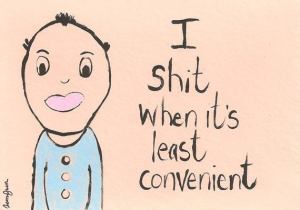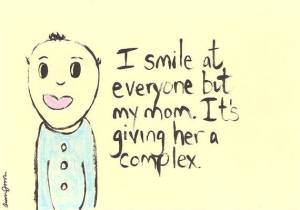The Creepy Baby is a cartoon infant in a flowing blue nightgown. He looks like a cross between the cherub from the Gerber ad and the Roswell alien. He takes up half the page while his utterances fill the other. Though I drew him again and again, I never knew what he was going to say until he said it.
Pregnant women are told they will feel an all-encompassing rush of love, a powerful and overwhelming tidal wave of love the first time they see their babies. They will fall in love at first sight. My son Teddy was born on November 19, 2010, but I didn’t love him at first sight. I didn’t love him an hour later. Or the next day. Or the day after that. Days turned into weeks then months. I still didn’t feel particularly attached to him. He was like a Key Lime pie. Though I like every other kind of pie, I’m not crazy about Key Lime. When someone offers me a piece, I say, no thank you, none for me! unless, of course, the situation requires that I choke it down out of social courtesy.
I was like someone who agreed to take care of a Key Lime pie until his real mother showed up. I sang to him, rocked him, nursed him, bathed him, cooed and smiled at him. I told him, along with everyone else, that I loved him but I was only going through the motions. I was determined to keep these terrible thoughts and feelings to myself because what if someday he finds out?
I don’t know exactly when the phrase zero-to-three first popped into my head. I only know once it was there, it was always there. I hated thinking it, but I couldn’t not think it. I’d read somewhere that the most important years in a child’s physical, cognitive, social and emotional development are ages zero to three. During that time, he learns to walk and talk, eat with a fork and use the toilet, say please and thank you. What he experiences from ages zero to three sets the foundation for what he knows about love. What he knows will impact him for the rest of his life. I thought zero-to-three meant if I wanted to be a good mother—which I did want, very much—I should kill myself before I caused my baby any serious psychological damage, only killing myself would have to wait until he turned three so I didn’t cause him any serious psychological damage.
Even then, I understood that thought—and the others like it—was crazy. Since crazy people don’t know their thoughts are crazy, good thing I wasn’t crazy. I was, however, exhausted, ashamed and very sad. On February 14, 2011, when Teddy was ten weeks old, I was diagnosed with postpartum depression, a serious but common and treatable condition.
Except for various reasons, I went untreated. So I remained exhausted, ashamed and sad for a long time. Zero-to-three evolved from being a disturbing, intrusive, unwanted thought to sounding like a pretty good idea. I used it to remind myself that this exhaustion, shame and sadness had an expiration date.
I needed the reminder. Otherwise, I got caught up thinking about Sisyphus pushing that huge boulder to the top of a hill, only to have it roll back down. He pushes it up again; it rolls back down. Up and down, over and over, again and again. It never ends. (I noticed a similar lack of resolution in the songs I sang to Teddy. The wheels on the bus go round and round all through the town but the bus never reaches a final destination. Though the itsy bitsy spider climbs the water spout, it never makes it to the top. The song that never ends really does go on and on, my friend.) It seemed to me that if a fictional character from Greek mythology could spend eternity pushing a boulder up a hill, a good mother could, for the sake of her baby’s psychological well-being, wait three years to kill herself. Compared to infinity, three years is nothing.
Good thing I’m not a good mother. I must be over postpartum depression because I have a hard time recognizing the person who cooked up zero to three. Who was that cold-hearted woman who didn’t bond with her baby? She might have been Teddy’s crazy mother, but surely she isn’t any Diana Joseph I know or would care to know. I want to reach through the fog and shake her, tell her, get a grip! knock it off! What is your problem? Pull yourself together! She’s so embarrassing that it’s tempting to pretend that she never existed.
Except she did.
There are times when I wonder if she still does. During a game of Hide and Seek, is she the one calling out, Oh Teddy, where are you? I can’t find you! while flipping through a People magazine—or is that me? When all signs and symptoms indicate yet another ear infection, is hers the unsympathetic voice saying, I don’t have time for this—or is it mine? Who is that wild-eyed woman so worn out from arguing with her toddler about brushing his teeth that she shows him pictures of meth mouth? Look! she says. Here’s what happens when people won’t brush their teeth!
Am I the one who felt guilty when he burst into horrified tears?
Or am I the one who felt smug that it got the job done?
I’m working on a memoir about my experience with postpartum depression, maternal ambivalence, motherhood and identity. I worry that writing about those subjects is a bad idea. I mean, aren’t there already enough “momoirs”—does the world really need another? Haven’t we heard plenty about how being a mother is hard? Isn’t it whiny, navel-gazing and narcissistic to blather on about how exhausted, ashamed and very sad you were? Depressed people aren’t really known for their get-up-and-go; they’re more famous for their lay-around-and-mope, and who wants to read 200 pages of that? Boo hoo hoo! Save it for your journal, lady! Tell it to your therapist! Maybe you should continue to keep the terrible thoughts and feelings you had to yourself because what if someday your son finds out?
These are hard questions which is what makes them good questions, important and necessary questions. The thing that’s both irritating and interesting about answering them is that they lead to other Big Questions: How do I keep from coming across like a whiny, navel-gazing narcissist? How do I accurately describe isolation, loneliness, self-doubt, depression, anxiety while at the same time tell a story that doesn’t have a lot of plot, just a woman in conflict with who or what? (Herself? The baby? Cultural attitudes about motherhood?) How can I use everything I know about craft to find a new way to say that being a mother is hard?
I think the Creepy Baby was a start.



